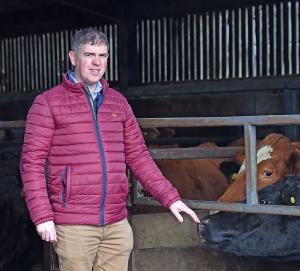The agricultural industry is under pressure to support more environmentally sustainable farming practices.

To meet the targets set out by the Climate Change Act (NI) 2022 there is urgent need to ‘decarbonise’ our beef production systems. Methane production (a by-product of microbial fermentation) is by far the greatest challenge facing the red meat industry currently. Methods to reduce methane production include both direct and indirect methods.
Direct methods of reducing methane production per kg of feed consumed is normally associated with genetic selection for more efficient animals or through dietary supplements which inhibit the production of methane. The most effective indirect methods involve reducing the number of unproductive days in the animal’s lifecycle, namely reducing the days to slaughter, and improving fertility.
The average slaughter age for steers and heifers in Northern Ireland during 2023 was 28 and 26 months respectively. There is potential to reduce the average slaughter age to 24 months (or younger) through improving the nutrition and performance during the life time of the animal. AFBI research has clearly shown how improvements in forage quality (both grazed grass and grass silage) can enhance performance during the growing and finishing phases of the animal’s life cycle. Improving the quality of the forage substitutes the need for high levels of concentrates to achieve younger slaughter ages without compromising on carcass weights. Whilst concentrates would enhance performance and aid younger slaughter ages, they increase the amount of imported phosphorus onto the farm which creates another environmental problem, so should be avoided as far as possible.
At the Beef and Sheep “Farming for the Future” Open Day on the 19 June, the AFBI Hillsborough Beef Research Team will outline nutritional approaches which can be adopted to help reduce the methane and phosphorus losses from beef systems. The open day will also offer the opportunity to hear about the latest research findings on grassland management, soil health, animal health, welfare and genetics, slurry management, as well as an opportunity to view the recently established Biomass Connect platform demonstrating opportunities for increasing biomass on farms. Don’t miss this opportunity to get updated on recent research findings across a wide range of topics aligned with beef and sheep farming.
Visitors should park at Hillsborough Castle carpark, off the A1 dual carriageway. Please follow the AA road signs for “AFBI Hillsborough Open Days Parking”. You will then be taken to the AFBI site by bus. Please allow extra time for your journey to accommodate these carparking arrangements.
For more information on this Beef and Sheep Open Day on Wednesday 19 June or the Dairy Open Day on Tuesday 18 June, please register or scan the QR code:

Notes to editors:
AFBI’s Vision is “Scientific excellence delivering impactful and sustainable outcomes for society, economy and the natural environment”.
AFBI’s Purpose is “To deliver trusted, independent research, statutory and surveillance science and expert advice that addresses local and global challenges, informs government policy and industry decision making, and underpins a sustainable agri-food industry and the natural and marine environments”.
AFBI’s core areas:
- Leading improvements in the agri-food industry to enhance its sustainability.
- Protecting animal, plant and human health.
- Enhancing the natural and marine environment.
Latest news
- Managing Nature Based Risks to the UK Economy and Opportunities for Green Finance 08 April 2025
- AFBI Hillsborough host AERA committee 27 March 2025
- The Omics Days Conference 27 March 2025
- Resilience, Sustainability and Innovation survey 03 March 2025
